 “The Voice of America—the United States Government overseas radio broadcasting station founded in 1942—ignored the subject of the Holocaust throughout the Second World War,” American scholar Holly Cowan Shulman wrote in a 1997 article published in Historical Journal of Film, Radio and Television. She noted that U.S. government officials in charge of VOA were “either Jewish or philo-Semites,” but the radio station during World War II “said very little about the persecution of the Jews of Europe at all.” 1
“The Voice of America—the United States Government overseas radio broadcasting station founded in 1942—ignored the subject of the Holocaust throughout the Second World War,” American scholar Holly Cowan Shulman wrote in a 1997 article published in Historical Journal of Film, Radio and Television. She noted that U.S. government officials in charge of VOA were “either Jewish or philo-Semites,” but the radio station during World War II “said very little about the persecution of the Jews of Europe at all.” 1
As the Russian propaganda threat is again being discussed in numerous U.S. media articles today and in the U.S. Congress, while fears are also raised that any new U.S. government anti-propaganda measures could turn into government efforts to propagandize to Americans, this article looks at how the Soviet propaganda during World War II was incorporated into U.S. government-funded Voice of America radio broadcasts as well as into domestic propaganda and censorship activities which were later judged by a bipartisan congressional committee to be detrimental to American interests and values.
Soviet Propaganda Overshadowed the Holocaust on Voice of America
By Ted Lipien
The Voice of America (VOA) was not alone in being largely silent during World War II on the extermination of six million European Jews by Nazi Germany. The Roosevelt White House and the State Department also said very little about the Jewish Holocaust, as did most of mainstream U.S. media, but VOA’s silence was particularly glaring since it was a U.S. government operation funded by U.S. tax dollars that in addition to foreign radio broadcasts also engaged in domestic propaganda and illegal media censorship in the United States.
During World War II, the Voice of America covered the Holocaust even more scantily than The New York Times and most other American newspapers, magazines and radio stations. It was a shameful failure of America’s elites except for some members of Congress and a few other influential individuals who unsuccessfully tried to bring greater public attention to the various acts of genocide in Nazi-occupied Europe, as well as in Soviet Russia. Most American journalists with the exception of a few also failed to give sufficient coverage to reports coming from Europe that Jewish, men, women and children were being systematically exterminated on a massive scale because they were Jews. Most American media also had ignored or downplayed earlier arrests, mass deportations and executions in the Soviet Union while Hitler and Stalin were still allies after their mutual partition of Poland at the outbreak of World War II and the brutal Soviet annexation of Lithuania, Latvia, and Estonia in 1940. All of these actions were being undertaken as a result of the secret provisions of the 1939 Hitler-Stalin Pact. The fact that many Jews were also among the victims of these early Soviet actions likewise did not get much from American media attention after the Soviet Union became a U.S. war ally, and it was completely ignored by the Voice of America throughout the duration of the war.
After Hitler betrayed Stalin and attacked the Soviet Union in the summer of 1941, the main preoccupation of VOA from 1942 onward was to advance support for the U.S.-Soviet war alliance to defeat Hitler. Anything else was of secondary importance to American propagandists in charge of the Voice of America. It was true that a quick victory over Nazi Germany would have put a quick end to the killing of the Jews in Europe, but more information and more public discussion of the Holocaust in the United States could have resulted in military and diplomatic actions that might have led to at least some disruptions of Hitler’s genocidal plans and could have allowed more Jews to find refuge in the United States. There were fears in U.S. government circles, however, that these actions could delay a speedy conclusion of the war. It is highly doubtful that such fears were justified, but one of main Soviet propaganda themes was that anything that could delay the opening of the second front by the Western allies was to be avoided at all cost.
Humanitarian considerations involving the Jews and any other groups facing persecution in Europe were likewise not the highest priority within the leadership of the Voice of America, which followed the Soviet propaganda closely during the war. They were seen by some as a dangerous distraction because the Soviets also saw it the same way. Most communists and leftists always looked down upon the emphasis on ethnic or religious distinctions as outdated bourgeois concepts and saw class distinctions and class struggle as being of primary importance. Some progressive Americans may have even believed that Stalin was right in his fascist-like persecutions of entire ethnic groups, such as the Crimean Tatars and the Balts, because he accused them of being Nazi collaborators and he could not be wrong. Jews could not be suspected of having any sympathy for Hitler or for fascism, although two Polish Jews in the Soviet Union were charged with being spies and were executed despite Polish and American protests. There were also other dangers to raising the Jewish question in the United States during the war as it could focus public attention on the Soviet policy of forcibly making Jewish refugees Soviet citizens. The Soviets were preventing Jewish refugees from leaving the Soviet Union, arrested many of them and either sent them to labor camps or conscripted them into the Red Army. Many left-leaning Americans found it hard to believe that Stalin could do anything wrong and dismissed such news as anti-Soviet propaganda generated by the Nazis and Nazi sympathizers.
American officials in charge of foreign broadcasts and VOA journalists within the Office of War Information (OWI), many of whom were enthusiastic admirers of the Soviet Union, had their mind set first of all on producing apologia for Stalin to counter what they saw as subversive criticism from U.S. and foreign enemies aimed at the Soviet Union and the entire war effort. They strongly believed in progressive ideas and social justice but not in trying to save the Jews from the Holocaust at all cost. Any critic of the Soviet Union was considered an enemy. Many of them saw it as their patriotic duty to protect the U.S.-Russia alliance and U.S. Russian war priorities from any kind of criticism or questioning. In line with Soviet propaganda and the Roosevelt White House policy, they believed that border changes in favor of the Soviet Union and enhanced Soviet influence in Eastern Europe were absolutely necessary for guaranteeing world peace and security and preventing any future Holocausts and other mass murders. They refused to advance traditional American interests and values if they perceived them to be in any way in conflict with the Soviet war effort and their own progressive ideals.
Under their leadership and the influence of Soviet propaganda, the focus of VOA programs was on the suffering and heroism of the entire Soviet people, and not on the Jews, the Poles or any other nationality. They accused the Poles and some of the other East European nationalities of being reactionary and anti-Semitic because that’s how they were portrayed by Soviet propaganda, although undoubtedly anti-Semitism was quite strong among some segments of the population in the region, as it was also in Soviet Russia and among the Soviet leadership headed by Stalin.
The early “fathers” of the Voice of America were mostly naive American idealists, incapable of deciphering Soviet propaganda and easily fooled by it. They were far more concerned about millions of Soviet soldiers being killed because the Western allies were delaying the opening of the second front in Western Europe than they were about the Jews or anybody else being murdered by the Nazis or the Soviets. That the Soviets would be capable of mass murders was something that they simply refused to believe. Soviet propaganda, which they followed closely, provided them with abundant information about the unquestionable martyrdom of the Russian people under the Nazi occupation. Information about the Jewish Holocaust was scant and for many of them difficult to believe, or not as nearly as important as American-Soviet war aims and their own main ideological objectives. Whatever detracted from the theme of the Soviet-American friendship and Soviet contributions to the war effort was either ignored or put on the back burner, including the Holocaust. Any mention of Soviet crimes or communist threat to democracy was automatically censored by OWI officials and VOA broadcasters.
While the Holocaust story was downplayed and the Soviet atrocities story completely ignored, the anti-Semitic card was used constantly by the Soviets and eventually from time to time by pro-Soviet propagandists at VOA to describe various critics of the Soviet Union as “anti-Semites” and “fascists,” or in the case of VOA, to imply that individuals critical of the Soviet Union are anti-democratic reactionaries. These labels were applied even those who fought against the Nazis and tried to hide and protect the Jews. They were invariably called “fascists” by Soviet propaganda if they were in any way opposed to the Soviet rule. As the war continued and Soviet attacks on non-communist U.S. allies critical of Stalin’s imperial ambitions increased, the Voice of America started to ignore anti-communist and anti-Nazi underground movements and anti-communist governments-in-exile and later proceeded to criticize them as well, although not in such crude terms as Radio Moscow. It is fascinating to watch how Putin’s Russia is exploiting the very same WWII Soviet propaganda themes, using now the same “fascist” and “anti-Semitic” labels against pro-Western Ukrainians and other critics of the Kremlin’s aggressive policies.
In my research on WWII propaganda, I discovered that the Congressional Record was a much better source of uncensored information about international events during the war and provided a much better reflection of American opinions than the official Voice of America which, contrary to its claims, did not broadcast accurate and objective news from the moment it first went on the air and for several years afterward. In the period from 1942 to 1945, there are numerous congressional speeches and media excerpts in the Record highly critical of the Office of War Information, within which VOA operated (VOA name was not used then). Several entries on the Holocaust printed in the Congressional Record during the war years did not mention any OWI or VOA efforts to publicize them. Commercial U.S. broadcasters and newspapers, while not nearly as good in documenting the Holocaust as they should have been, still did a much better job than the Voice of America.
The WWII U.S. government propaganda operation had only one purpose and it was not the Jewish question but the winning of the war. However, some of VOA’s leaders and broadcasters also had their own ideological agenda, which went well beyond what the White House and the State Department wanted the U.S. propaganda to be. In addition to supporting Stalin’s territorial claims in Eastern Europe, which President Roosevelt accepted and supported, VOA propagandists also firmly believed in advancing communist-led progressive movements in Western Europe. This produced a major scandal at the Voice of America in 1943 and the forced resignation of the first VOA director, Hollywood actor John Houseman. He and a few others wanted to see the communists be put in charge of any post-war Italian government while the White House, the State Department and the U.S. military authorities were trying to get the existing pro-German government in Rome to switch sides. A provocative VOA radio broadcast nearly derailed U.S. government efforts to shorten the war and to save lives of American soldiers when it described King Victor Emmanuel as the “moronic little King” of Italy. 2
WWII-era Assistant Secretary of State Adolf A. Berle recalled in his memoirs that OWI and VOA officials were “following an extreme left-wing line in New York, without bothering to integrate their views with the State Department.” 3 In this instance, they were rebuked by President Roosevelt and some, including John Houseman, were fired or told to resign. After the war, Berle served on the Board of Directors overseeing Radio Free Europe from its beginning until 1963.
The “moronic little King” incident showed that contrary to conventional wisdom and various claims then and later, the most blatant propaganda throughout VOA’s history, both then and now, was originated not by the White House or the State Department (although it was often inspired by policies set by U.S. presidents) but by poorly-supervised VOA officials and VOA editors and journalists themselves whenever they decided, often on their own, to become activists in support of a particular policy, an ideological cause or a partisan issue. Several influential VOA broadcasters turned into propagandists for communist regimes in Eastern Europe after leaving the Voice of America after the war.
It should be stressed that during World War II, the Voice of America was not trying to deny the Holocaust as it was trying to deny Stalin’s crimes, but in presenting Stalin as a liberator, a newly-converted democrat, and a guarantor of democracy in liberated Europe, it had little time left for stories specifically on the Jewish genocide. In the last years of the war, Soviet propaganda directives were incorporated into propaganda directives for VOA through the exchange arranged by the OWI officials. The driving force behind this coordination of propaganda with the Soviets was one of VOA’s “fathers,” liberal American playwright Robert E. Sherwood.
During the war, Sherwood was a top OWI program director and also Roosevelt’s speechwriter. He “boldly proclaimed that America had to fight Nazi propaganda with American propaganda,” 4 which under his watch quickly became his own propaganda, based on what he thought President Roosevelt would want, mixed with Soviet propaganda. Repeating the Soviet propaganda line, Sherwood advised VOA journalists in his “Weekly Propaganda Directive” dated May 1, 1943 that some Poles may be cooperating with Hitler, even though Poland was a Nazi-occupied country where such cooperation from the government in exile and the underground state was nonexistent.
5“Some Poles are consciously or unconsciously cooperating with Hitler in his campaign to spiritually divide the United Nations.”
He also warned VOA “not to commiserate them or apologize to them” because “Almost every European nation emphasizes its periods of martyrdom and its historical difficulties.” 6
The “Propaganda Directive” was designed to prevent VOA journalists from blaming Stalin for the Katyn Forest massacre of the Polish war prisoners, but its propagandistic and anti-humanitarian message could just as easily be applied to any group suffering persecution under the Nazis and the Soviets, including Jews. The propaganda message Sherwood wanted VOA to promote was that the Soviet war effort against the Nazis was more important than the martyrdom of any single group or any other considerations. Sherwood’s 1943 “Propaganda Directive” includes a single reference to the Polish Jews being killed in Nazi extermination camps.
“Play up the Nazis’ cruel treatment of Jews,” Sherwood wrote. But he also showed his callous disregard for the truth and for humanitarian concerns.
7“Use the retribution theme to make the loss of 10,000 Polish officers recede into the background. Of course,the 10,000 officers [executed on Stalin’s orders] must not be mentioned.”
As Holly Cowan Shulman points out, U.S. government officials in charge of the Voice of America were definitely not anti-Semitic. Robert E. Sherwood and OWI director Elmer Davis were not Jewish, but VOA director John Houseman and several other OWI and VOA officials were American Jews or Jewish refugees from Europe. To many of them, however, their personal ideological commitment to opposing Nazi Germany and fascism and their fascination with the Soviet Union as a model of social justice and Stalin as a great leader were far more important than any other loyalties. They ignored not just the Jewish Holocaust. They also ignored the murder of thousands of Polish officers carried out on the orders of Stalin in the Katyn Forest near Smolensk and in other locations in the Soviet Union in the spring of 1940. In line with the Soviet propaganda and directives from Robert E. Sherwood, the Voice of America immediately blamed the mass murder of the Polish war prisoners on the Nazis even though the U.S. State Department warned VOA to stay clear of the controversy because the evidence of the Soviet guilt was already very strong. Elmer Davis himself wrote and recorded a commentary supporting the Soviet denial of responsibility for the mass murder.
The Soviet propaganda directives shared by Sherwood with VOA during the later years of the war did not focus on the Jewish question, but they included plenty of charges of anti-Semitism and fascism advanced against all critics of Soviet policies, including loyal U.S. allies, their leaders, and their soldiers fighting the Nazis. Jan Karski, a Polish underground army (Home Army – “AK”) emissary from German-occupied Poland who had described to President Roosevelt the methodical persecution, starving and extermination of the Jewish population, was politely listened to, but his accounts were dismissed as possibly exaggerated and were largely ignored. As an anti-communist democrat, Karski would be clearly among those whom the Soviet propaganda accused of being anti-Semitic and supporting the Nazi cause. While in Poland, Karski was imprisoned briefly by the Gestapo but was rescued by the Polish underground. Before being sent abroad to brief British and American leaders and media, he visited the Warsaw Ghetto to document the German atrocities against the Jews. 1982, Yad Vashem recognised Jan Karski as Righteous Among the Nations. In 1994, he was made an honorary citizen of Israel in honor of his efforts on behalf of Polish Jews during the Holocaust.
Officials in charge of VOA thought that they knew better what was good for the United States, the war effort and world peace. This is what scholar of U.S. World War II propaganda Holly Cowan Shulman, who is the daughter of one of the early VOA directors, Louis G. Cowan, and the sister of a later VOA director, Geoffrey Cowan, wrote about the Voice of America propagandists in her book “The Voice of America: Propaganda and Democracy, 1941-1945” published in 1990 by The University of Wisconsin Press:
8“Sherwood, Barnes, Wartburg, and Johnson, and their like-minds colleagues the Overseas Branch [OWI’s Voice of America] believed that propaganda could mold and influence foreign policy. Propaganda, in other words, was not merely an expression of policy made by others. The propagandists believed they could make their own version of American foreign policy come true. They believed they were right; they argued that they understood the foreign influence of American policy ways that the State Department, and even the president, did not; and they used the Voice of America to enter the foreign policy debate between members of the Roosevelt’s administration.”
A Jewish refugee from Austria Julius Epstein who had worked as a Voice of America journalist and was pushed out for criticizing his pro-Soviet bosses and colleagues made this observation after the war:
9“I mean those writers, translators and broadcasters who so wholeheartedly and enthusiastically tried for many years to create ‘love for Stalin,’ when this was the official policy of our ill-advised wartime Government…”
The wartime Poland’s Ambassador to Washington Jan Ciechanowski wrote in his 1947 book “Defeat in Victory”:
10“Of all the United States Government agencies, the Office of War Information [where Voice of America was placed], under its new director, Mr. Elmer Davis, had very definitely adopted a line of unqualified praise of Soviet Russia and appeared to support its shrewd and increasingly aggressive propaganda in the United States. The OWI broadcasts to European countries had become characteristic of this trend.”
11“I protested repeatedly against the pro-Soviet character of such propaganda. I explained to those responsible for it in the OWI that the Polish nation, suffering untold oppression from Hitler’s hordes, was thirsting for plain news about America and especially about her war effort, her postwar plans, and her moral leadership, that Soviet propaganda was being continuously broadcast anyway to Poland directly from Moscow, and there seemed no reason additionally to broadcast it from the United States.”
12“When I finally appealed to the Secretary of State and to divisional heads of the State Department, protesting against the character of the OWI broadcasts to Poland, I was told that the State Department was aware of these facts but could not control this agency, which boasted that it received its directives straight from the White House.”
The Office of War Information went further in its pro-Moscow activities and tried to censor ethnic media outlets in the U.S. that reported about Soviet crimes. Some of the attempts to silence American radio commentators was documented in the Congressional Record during the congressional Katyn investigation launched by the bipartisan Madden Committee in the early 1950s.
In its “Final Report” published in December 1952, the Madden Committee concluded:
“1. In submitting this final report to the House of Representatives, this committee has come to the conclusion that in those fateful days nearing the end of the Second World War there unfortunately existed in high governmental and military circle a strange psychosis that military necessity required the sacrifice of loyal allies and our own principles in order to keep Soviet Russia from making a separate peace with the Nazis.
For reasons less clear to this committee, this psychosis continued even after the conclusion of the war. Most of the witnesses testified that had they known then what they now know about Soviet Russia, they probably would not have pursued the course they did. It is undoubtedly true that hindsight is much easier to follow than foresight, but it is equally true that much of the material which this committee unearthed was or could have been available to those responsible for our foreign policy as early as 1942.
And, it is equally true that even before 1942 the Kremlin rulers gave much evidence of a menace of Soviet imperialism paving the way for world conquest. Through the disastrous failure to recognize the danger signs which then existed and in following a policy of satisfying the Kremlin leaders, our Government unwittingly strengthened their hand and contributed to a situation which has grown to be a menace to the United States and the entire free world.”
“ 13
The Madden Committee named after Rep. Ray Madden (D-IN) also reached this conclusion:
14“5. This committee believes that if the Voice of America is to justify its existence it must utilize material made available more forcefully and effectively.”
There was no similar censorship of news stories about the Holocaust or any specific anti-Jewish bias at the Voice of America during World War II, but the Nazi extermination of the European Jewry was not high on the agenda for news coverage and commentary for the pro-Soviet propagandists at OWI and VOA. Their main concern was how to best coordinate U.S. and Soviet propaganda in VOA programs to make the Soviet Union and Stalin look good and to present the Soviets as the main enemies of fascism, friends of the American people and defenders of freedom and democracy.
Photo: Jews captured and forcibly pulled out from dugouts by the Germans during the Warsaw Ghetto uprising. Photo from Jurgen Stroop‘s report to Heinrich Himmler.
Original or archival image caption, which may be erroneous, biased, obsolete or politically extreme. German: Mit Gewalt aus Bunkern hervorgeholt Forcibly pulled out of bunkers
Notes:
- Holly Cowan Shullman, “The Voice of America, US Propaganda and the Holocaust: ‘I Would Have Remembered’,” Historical Journal of Film, Radio & Television 17, no. 1 (March 1997): 91-103. ↩
- Holly Cowan Shulman, The Voice of America: propaganda and Democracy, 1941-1945 (Madison: The University of Wisconsin Press), 99-102. ↩
- Adolf E. Berle, Navigating the Rapids: 1918-1971, ed. Beatrice Bishop Berle (New York: Harcourt Brace Jovanovic, Inc., 1973), 440. ↩
- Holly Cowan Shulman, The Voice of America: Propaganda and Democracy, 1941-1945, 5. ↩
- Robert E. Sherwood, Director, Overseas Branch, Office of War Information; RG208, Director of Oversees Operations, Record Set of Policy Directives for Overseas Programs-1942-1945 (Entry363); Regional Directives, January 1943-October 1943; Box820 ↩
- Robert E. Sherwood, Director, Overseas Branch, Office of War Information; RG208, Director of Oversees Operations, Record Set of Policy Directives for Overseas Programs-1942-1945 (Entry363); Regional Directives, January 1943-October 1943; Box820 ↩
- Robert E. Sherwood, Director, Overseas Branch, Office of War Information; RG208, Director of Oversees Operations, Record Set of Policy Directives for Overseas Programs-1942-1945 (Entry363); Regional Directives, January 1943-October 1943; Box820 ↩
- Holly Cowan Shulman, The Voice of America: Propaganda and Democracy, 1941-1945, 91. ↩
- Julius Epstein, Congressional Record: Proceedings and Debates of the 81st Congress, Second Session, Appendix. Part 17 ed. Vol. 96. August 4, 1950, to September 22, 1950. Washington, DC: United States Government Printing Office, 1950. A5744-A5745. ↩
- Jan Ciechanowski, Defeat in Victory, (Garden City: Doubleday & Company, Inc., 1947) 115-116. ↩
- Ciechanowski, Defeat in Victory, 130. ↩
- Ciechanowski, Defeat in Victory, 131. ↩
- The Katyn Forest Massacre: Final Report of the Select Committee to Conduct an Investigation and Study of the Facts, Evidence, and Circumstances on the Katyn Massacre (Washington: United States Government Printing Office, 1952) 11-12. ↩
- The Katyn Forest Massacre: Final Report of the Select Committee to Conduct an Investigation and Study of the Facts, Evidence, and Circumstances on the Katyn Massacre (Washington: United States Government Printing Office, 1952) 12. ↩
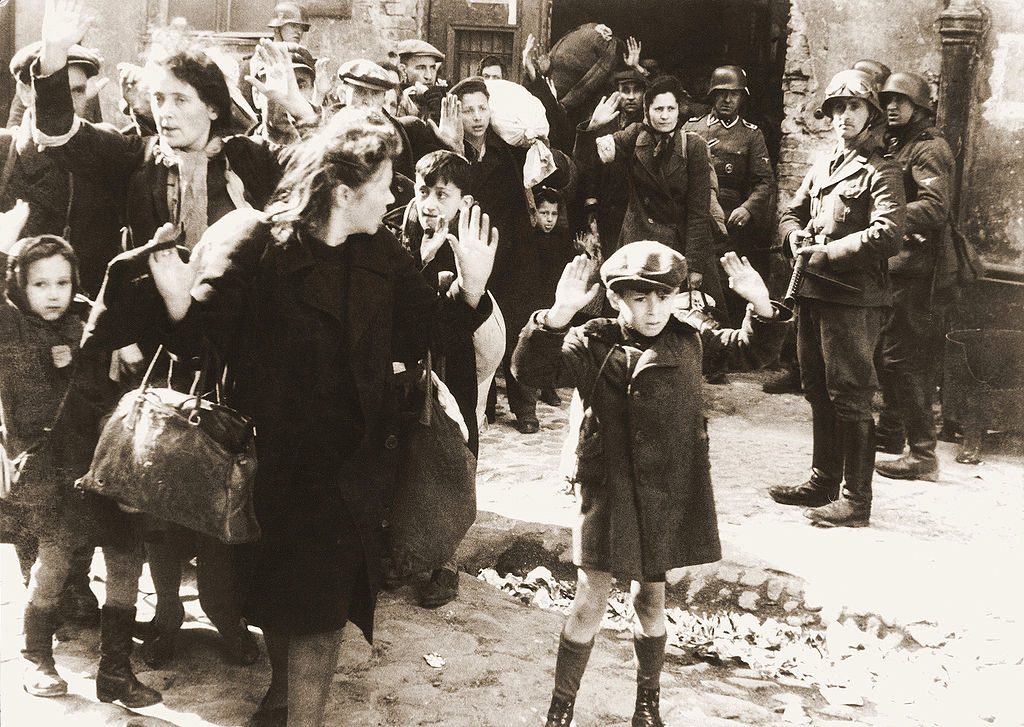

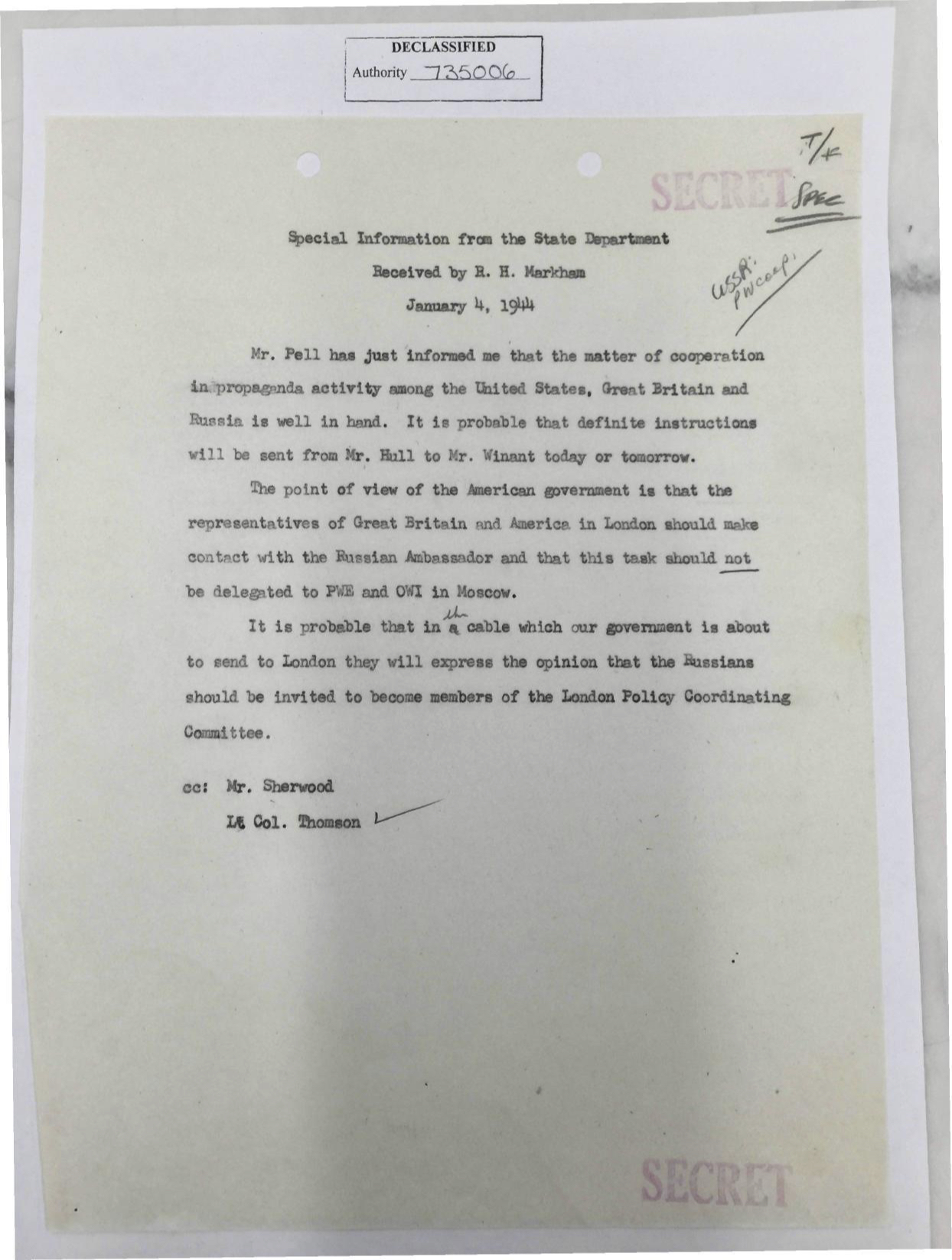
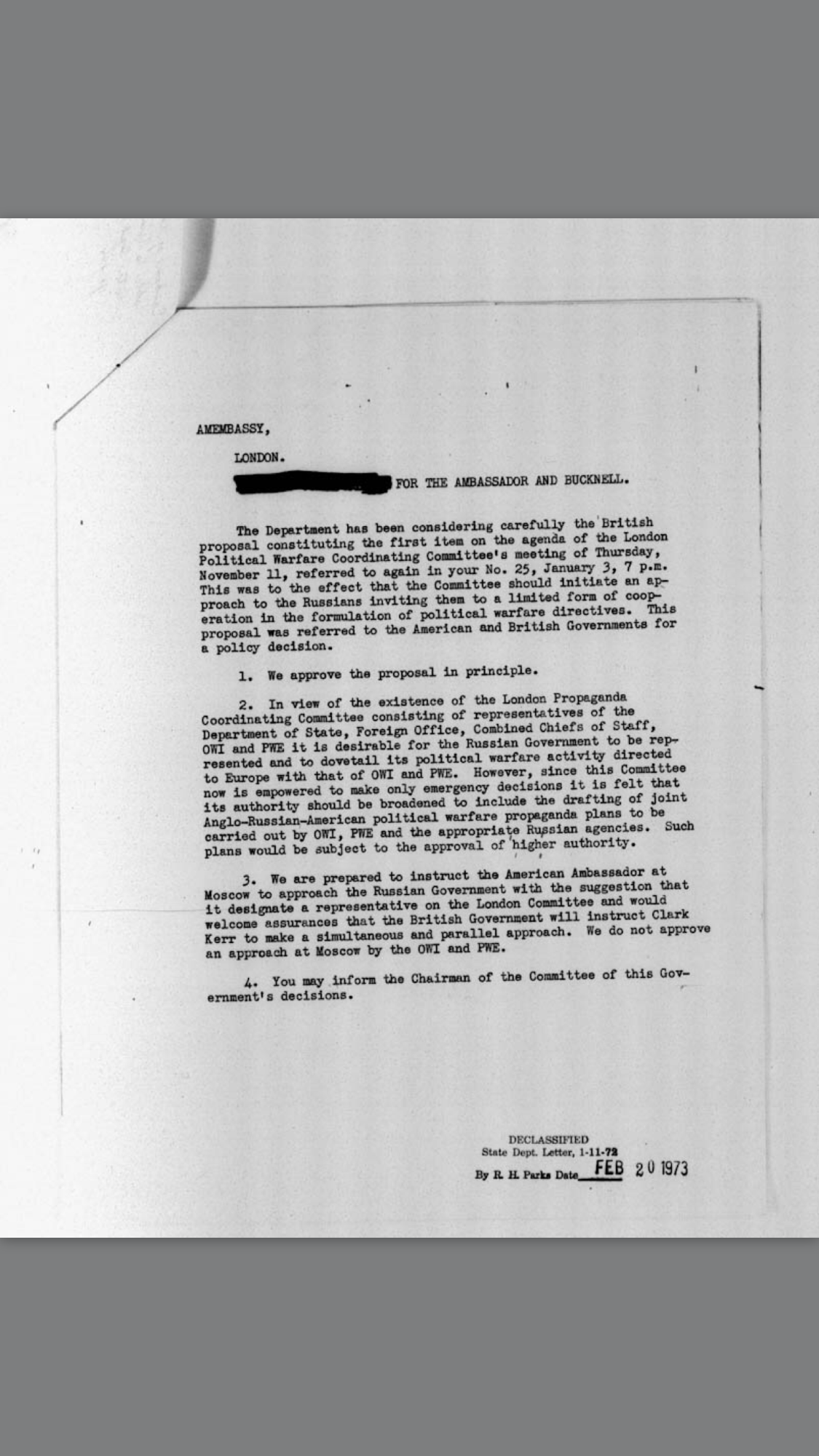
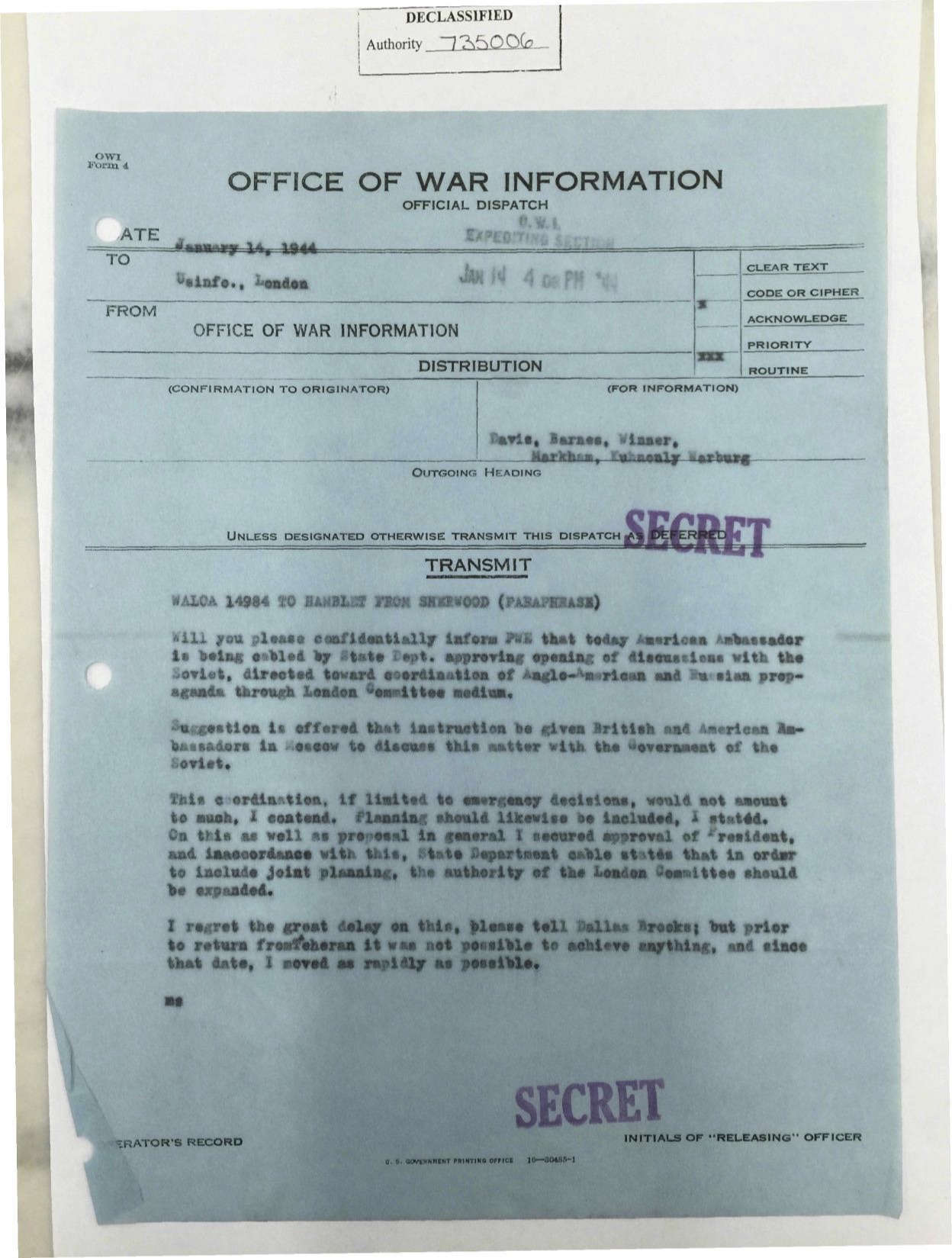
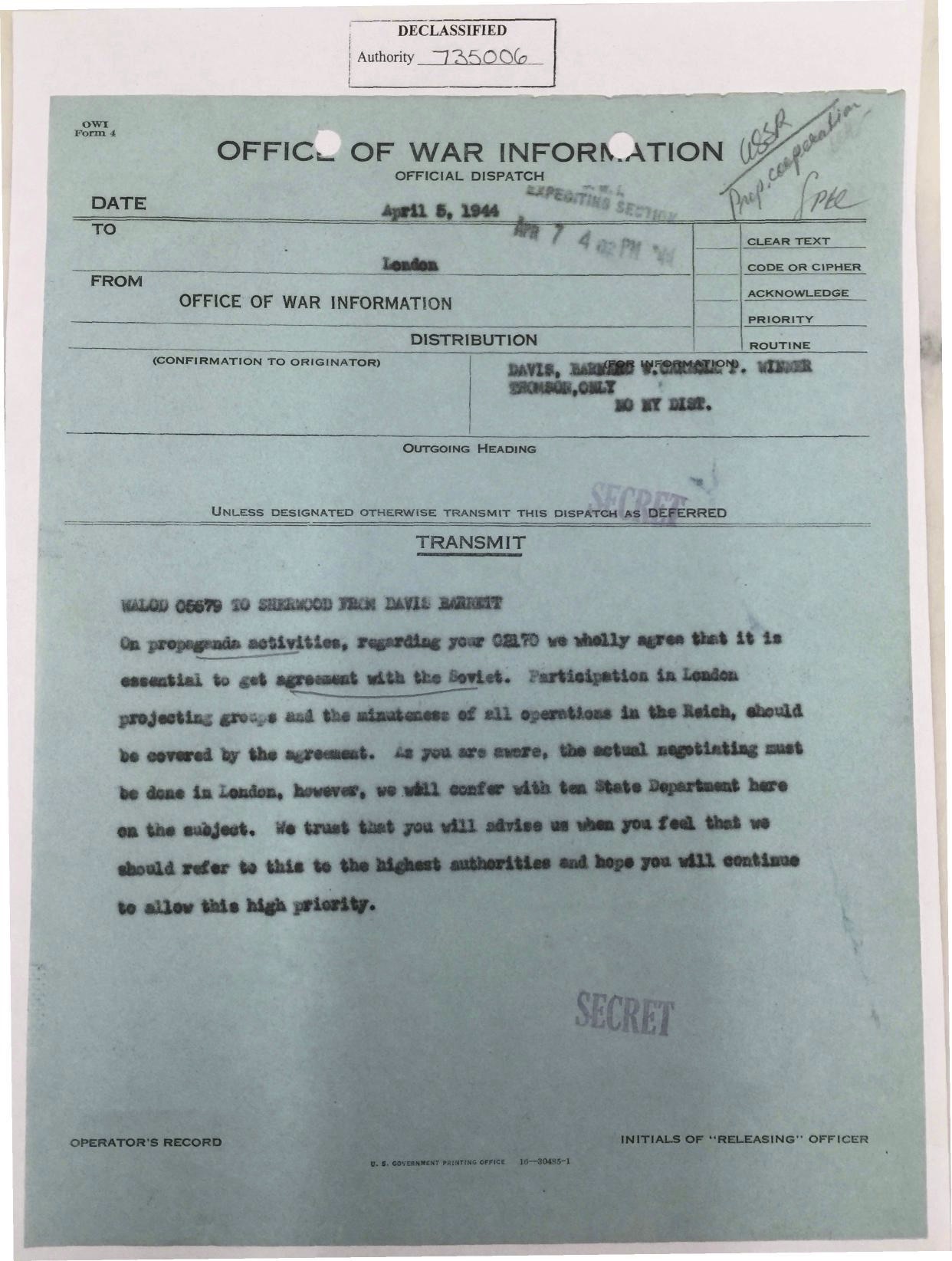
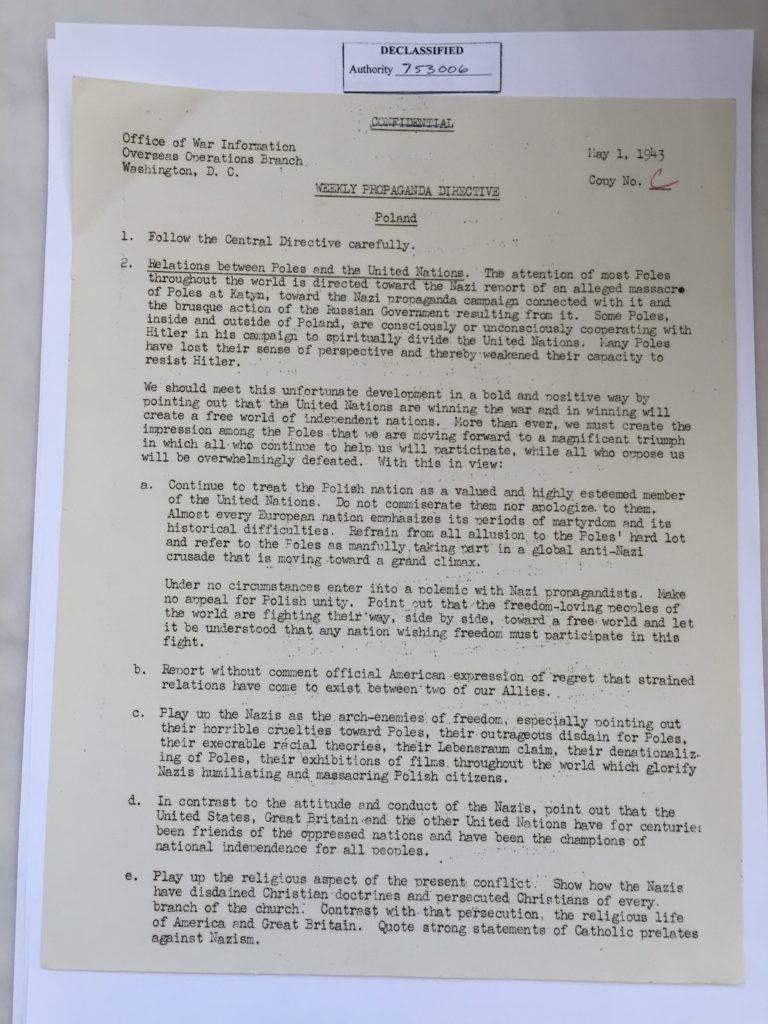
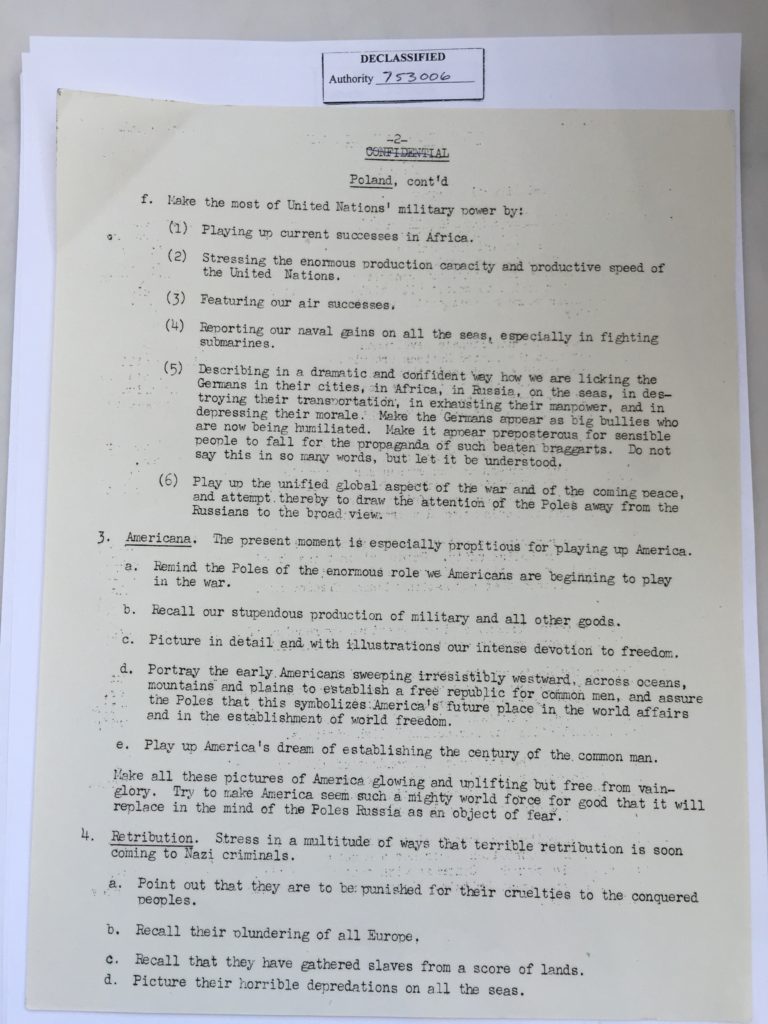
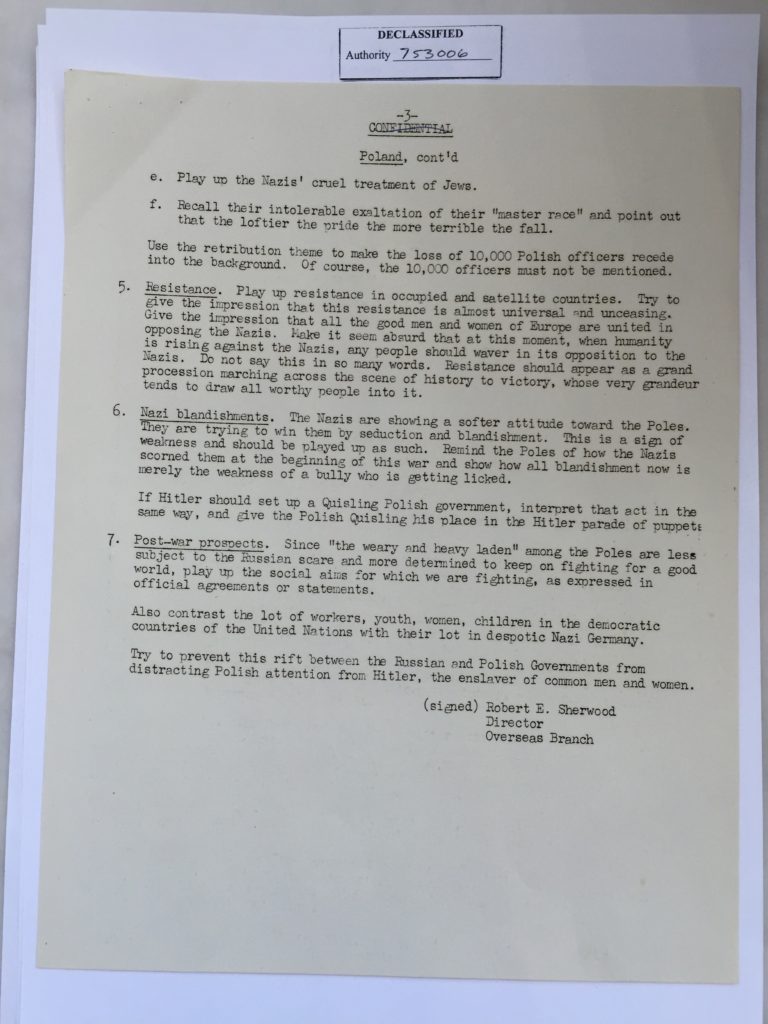
2 Comments
Comments are closed.